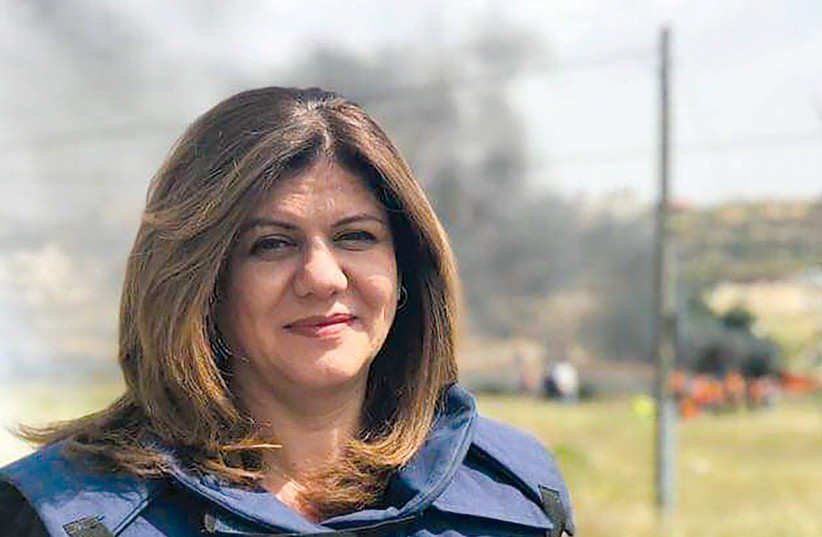Al Jazeera can prove its journalist Shireen Abu Akleh was “killed by an Israeli bullet in cold blood,” the network’s US-based bureau chief Abderrahim Foukara told the United Nations Security Council (UNSC) on Tuesday.
“The network has the evidence and the witnesses to support that position,” he told the council. Under Ireland’s auspices, the UNSC held an informal Arria-formula meeting in New York on Tuesday, devoted to the global topic of the “protection of journalists.”
But many of the speakers brought up Abu Akleh’s murder.
“Al Jazeera is considering all possible legal options to make sure justice is done, so that Shireen’s killing does not end up swept up under the carpet of impunity,” Foukara said. “Shireen Abu Akleh’s life matters.”
Arria-formula meetings allow individuals, organizations and other non-UNSC members to talk directly to members in an informal and confidential setting.

The 51-year-old veteran Palestinian-American journalist was killed on May 11 while covering an IDF raid in a refugee camp in Jenin for Al Jazeera.
A number of media outlets have done investigations into her death, using technology, videos and evidence from the scene.
The results of the latest of such probes, done by CNN, included testimony by explosive weapons expert Chris Cobb-Smith. Cobb-Smith said that the bullet markings on the tree next to where she was shot show that these were deliberate shots and not random firing.
Montana State University electrical and computer engineering Prof. Robert Maher told the news network that, based on audio recordings from the shooting, he had determined that Abu Akleh was shot by a rifle located from 177 to 197 meters away.
As a result of their investigation, CNN concluded that an IDF soldier may have deliberately targeted Abu Akleh.
IDF Spokesperson Unit
The IDF said in response that there is no basis to the claim that the shooting was intentional.
The Palestinian Authority has accused the IDF of killing Abu Akleh, but has not allowed Israel to forensically investigate the bullet that killed her.
The IDF has contended that Abu Akleh could have been killed either by Palestinian gunmen or by an IDF soldier. It has potentially located the army rifle that may have fired the bullet, but cannot complete its investigation without the bullet.
"There is no basis to the claim that the shooting was intentional."
IDF Spokesperson Unit
The IDF has said that while it is committed to finding the truth regarding the journalist’s death, it does not consider it to be a criminal matter, as it occurred during an exchange of fire with Palestinian gunmen.
It has also explored the possibility that a soldier had targeted what he believed to be a Palestinian gunman, but missed and hit Abu Akleh instead.
Video footage from the scene shows Abu Akleh walking with other journalists right before being shot, one of whom was also wounded in the shooting. There has not yet been any video or audio recordings showing an active Palestinian gunman near the journalists.
In the immediate aftermath of Abu Akleh’s death, the UNSC issued a statement condemning her murder but did not assign blame.
A number of countries were present at the UNSC Arria-Formula meeting, including the United States.
“We strongly condemn her killing as we do the killing of all journalists worldwide,” the US representative said. “We continue to call for a thorough and impartial investigation into Shireen’s death. We expect full accountability for those responsible upon conclusion of the investigation.
“We were also deeply disturbed by the violence that took place during her funeral procession. All families deserve to bury their loved ones in a dignified and unimpeded manner.”
Journalists killed while reporting worldwide.
Turning to Russia’s invasion of Ukraine, the US representative said that seven journalists had been killed while covering that war.
Russia has reportedly detained at least 21 journalists in Ukraine – and in many cases, their fate is unknown, she explained.
“These figures may only be the tip of the iceberg and they highlight Russia’s fear of truthful reporting of its war,” she said.
She added that women in journalism are “disproportionately impacted by threats and attacks, which are more often gendered and sexualized than threats against their male counterparts and increasingly take place online.”
The French representative said that 28 journalists had been killed worldwide since the start of this year and 477 were in prison.
Norwegian Ambassador Mona Juul said that on average “a journalist is killed every four days in the world. In nine out of ten cases, the killers go unpunished. Every attack on a media worker is an attack on the freedom of expression.”
